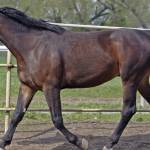Why Does Time of Feeding Affect Performance?

One of the most frequently asked questions regarding performance-horse feeding is when to feed before a competition.
Several studies have evaluated how feeding grain before exercise affects plasma concentrations of nutrients and hormones and substrate utilization during exercise. In each of these studies, a pre-exercise concentrate meal suppressed free fatty acid (FFA) availability and enhanced glucose uptake by muscle during exercise. Forage was not fed with the concentrate in any of these studies. Thus, it is not known whether feeding hay along with grain will alter substrate availability during exercise.
Therefore, a series of experiments was conducted to first evaluate how feeding forage along with grain influences plasma variables and water intake and then to determine whether these changes affect exercise performance. Additionally, a study was conducted to determine how forage alone affects exercise response.
Since time of feeding is particularly important for three-day event horses, the exercise test used was a competition exercise test (CET) performed on a high-speed treadmill and designed to simulate the physiological and metabolic stresses of the speed and endurance test of a three-day event. Feeding only forage before competition does not appear to interfere with FFA availability, and has no adverse effects other than possibly reducing plasma volume and increasing body weight. Feeding grain two hours before exercise will reduce FFA availability and increase glucose uptake by the working muscle.
This report of KER’s 1999 research was published in Advances in Equine Nutrition II.
Read the entire research paper, titled Time of Feeding Critical for Performance.








